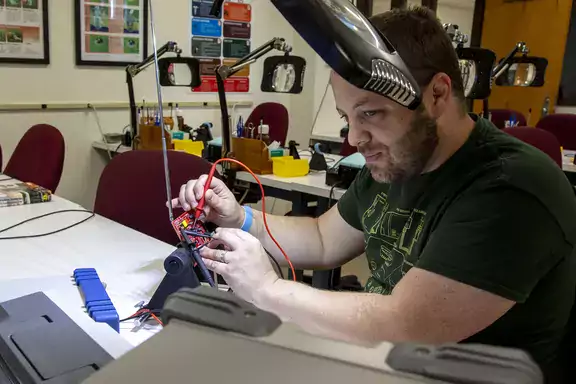A course of study that prepares the students to apply basic engineering principles and technical skills in electrical maintenance and management or in the design, planning, construction, development, and installation of electrical systems, machines, and power generating equipment. Includes instruction in electrical circuitry, prototype development and testing, systems analysis and testing, systems maintenance, instrument calibration, and report preparation.
Graduates may seek employment as technicians, engineering assistants, technical managers, or salespersons in electrical generation/distribution, industrial maintenance, electronic repair, or other fields requiring a broad-based knowledge of electrical and electronic concepts
Specific Requirements
Courses requiring a grade of “C” or better: DFT, EGR, ELC, ELN, and WBL
Good To Know
Why General Education?
You may be asking yourself, “Why do I have to take (course name) when it is not directly related to my major?”
General Education courses will help you develop skills necessary to be successful in your major and in life. General Education can teach you how to talk to your employer, write a paper in a major course, understand interest rates on your car, and much more. General Education can also give you the skills to be a better member of society and a more informed citizen. Critical thinking, global understanding, and appreciation for the human experience are hallmarks of a well-rounded education.
How many hours of General Education do I have to take?
If you are enrolled in an Associate of Applied Science Degree program, a minimum of 15 general education hours are required in the following categories:
- Six hours from Communication
- Three hours from Humanities & Fine Arts
- Three hours from Social & Behavioral Science
- Three hours from Natural Science & Mathematics
General Education courses have been pre-selected for you by your faculty from the following list:
| Communication | Humanities & Fine Arts | Social & Behavioral Science | Natural Science & Mathematics |
|---|---|---|---|
| COM-110 | ART-111 | ECO-251 | BIO-161 |
| COM-120 | ART-114 | ECO-252 | BIO-163 |
| COM-231 | ART-115 | HIS-111 | BIO-168 |
| ENG-110 | HUM-110 | HIS-112 | MAT-110 |
| ENG-111 | HUM-115 | HIS-131 | MAT-121 |
| ENG-112 | MUS-110 | HIS-132 | MAT-143 |
| ENG-114 | MUS-112 | POL-120 | MAT-152 |
| PHI-215 | PSY-150 | MAT-171 | |
| PHI-240 | SOC-210 | PHY-110/110A | |
| SOC-225 | PHY-121 |
Degrees designed to transfer to universities require more general education hours. If you are enrolled in the Associate in Arts or Associate in Science, you are required to take 45 hours of General Education from the following categories:
- Six hours in English Composition
- Six to nine hours in Communication / Humanities & Fine Arts
- Six to nine hours in Social & Behavioral Sciences
- Three to eight hours in Mathematics
- Four to eight hours in Natural Sciences
- 11 to 14 additional General Education hours
If you are enrolled in the Associate in Engineering, you are required to take 42 general education hours from the following:
- Six hours in English Composition
- Six hours in Communication / Humanities & Fine Arts
- Six work hours in Social & Behavioral Sciences
- 12 hours in Mathematics
- 12 hours in Natural Sciences
If you are enrolled in the Associate in Fine Arts in Visual Arts, you are required to take 25 general education hours from the following:
- Six hours in English Composition
- Six hours in Communication / Humanities & Fine Arts
- Six hours in Social & Behavioral Sciences
- Three to four hours in Mathematics
- Four hours in Natural Sciences
Additional information about General Education for transfer degrees, including courses that satisfy each category, may be found in the current College Catalog.
What will I learn in General Education?
At A-B Tech, our faculty have designed a general education core so that A-B Tech graduates will
learn the following:
Students will critically evaluate information:
- Students will demonstrate information literacy.
- Students will critique works of human expression.
- Students will analyze scientific literature.
Students will solve problems:
- Students will identify processes.
- Students will analyze problems.
- Students will interpret the results.
- Students will recommend appropriate strategies or solutions.
Students will effectively communicate.
- Students will communicate appropriately about the subject.
- Students will communicate appropriately with the audience.
- Students will communicate appropriately for the medium.
Ever wonder how A-B Tech awards credit for a certain course?
A-B Tech complies with the North Carolina State Board of Community Colleges Code, so your courses are assigned the course level and receive the same amount of credit as courses at all 58 North Carolina Community Colleges.
If you want to read more about this, see the A-B Tech Policy and Procedure for the Assignment of Course Level Credit.
